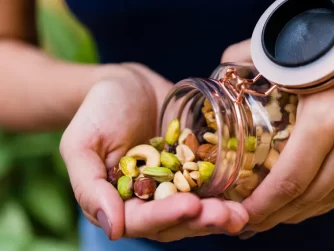Nutrition is one of the most confusing topics out there. One day, a food is a miracle superfood, and the next, it’s being blamed for everything from weight gain to disease. With so much misinformation floating around, it’s time to clear the air and bust some of the biggest nutrition myths once and for all. Let’s dig in!
Myth #1: Carbs Make You Fat
Carbohydrates have been demonized for years, but the truth is, they are not the enemy. The real problem? Processed carbs loaded with sugar and unhealthy fats. Whole, fiber-rich carbs like quinoa, brown rice, sweet potatoes, and fruit provide essential energy, support digestion, and keep you full longer. It’s about quality, not just quantity.
Myth #2: Fat Is Bad for You
For decades, people avoided fat like the plague. But fat is not the villain! Healthy fats from sources like avocados, nuts, olive oil, and fatty fish are crucial for brain function, hormone regulation, and even fat loss. The real culprits? Trans fats and highly processed oils found in fried and packaged foods. Instead of fearing fat, focus on choosing the right kinds.
Myth #3: You Need to Eat Small, Frequent Meals to Boost Metabolism
Many believe that eating every 2-3 hours keeps the metabolism humming. But studies show that meal frequency has little effect on metabolism. What matters more is the total number of calories and the quality of those calories. Some thrive on three solid meals a day, while others prefer smaller, more frequent meals. The key is finding what works for your lifestyle and hunger cues.
Myth #4: Eating After 8 PM Causes Weight Gain
It’s not about when you eat but what and how much you eat. Your body doesn’t suddenly decide to store fat just because the clock strikes 8 PM. If you’re eating nutrient-dense foods and staying within your daily caloric needs, eating at night won’t sabotage your progress. However, late-night snacking on chips, ice cream, and other junk food can be a problem.
Myth #5: Protein Is Only for Bodybuilders
Think protein is just for muscle-bound gym rats? Think again! Protein is essential for everyone. It helps build and repair tissues, supports immune function, and keeps you full longer. Whether you’re an athlete, a weekend warrior, or just trying to stay healthy, including sources like lean meats, fish, eggs, dairy, beans, and tofu will do wonders for your body.
Myth #6: All Calories Are Equal
A calorie from a candy bar does not have the same effect on your body as a calorie from grilled salmon. While calorie balance matters for weight management, the quality of those calories is just as important. Whole foods packed with fiber, protein, and healthy fats keep you full longer, regulate blood sugar levels, and support overall health, unlike empty calories from processed junk.
Myth #7: Detox Diets Help Cleanse Your Body
Your liver and kidneys already do an amazing job of detoxifying your body—no expensive juice cleanse required. Most detox diets are just a fancy way to cut calories and lose water weight. Instead of wasting money on “cleanses,” focus on drinking plenty of water, eating fiber-rich foods, and reducing processed junk to support your body’s natural detoxification processes.
Myth #8: Dairy Is the Best Source of Calcium
While dairy is a good source of calcium, it’s not the only one! Leafy greens like kale, collard greens, and bok choy, as well as almonds, chia seeds, and tofu, also provide plenty of calcium. If dairy works for you, great! But if you’re lactose intolerant or prefer to avoid it, you can still get strong bones from other sources.
Myth #9: Egg Yolks Are Bad for Your Heart
For years, egg yolks were blamed for raising cholesterol and increasing heart disease risk. But recent research shows that dietary cholesterol has little impact on blood cholesterol for most people. Egg yolks are packed with essential nutrients like choline, vitamin D, and healthy fats. So go ahead—enjoy the whole egg!
Myth #10: You Have to Cut Out Your Favorite Foods to Be Healthy
This is probably the biggest myth of all! Health isn’t about deprivation—it’s about balance. You don’t have to give up pizza, chocolate, or your favorite comfort foods. Instead, practice moderation, focus on nutrient-dense foods most of the time, and enjoy treats mindfully. A sustainable, healthy diet is one you can stick with long-term, not one that makes you miserable.
So, What Should You Eat?
Now that we’ve busted these myths, here’s a simple approach to eating well:
- Prioritize whole foods. Fill your plate with lean proteins, healthy fats, fiber-rich carbs, and plenty of fruits and vegetables.
- Stay hydrated. Water is essential for digestion, metabolism, and overall health.
- Balance your plate. Aim for a mix of macronutrients (protein, carbs, and fats) at each meal to keep your energy stable and cravings in check.
- Listen to your body. Eat when you’re hungry, stop when you’re full, and enjoy your food without guilt.
The bottom line? Nutrition isn’t about strict rules or quick fixes—it’s about making informed, sustainable choices. Forget the fads, ignore the myths, and fuel your body with real, nourishing foods that make you feel your best!







